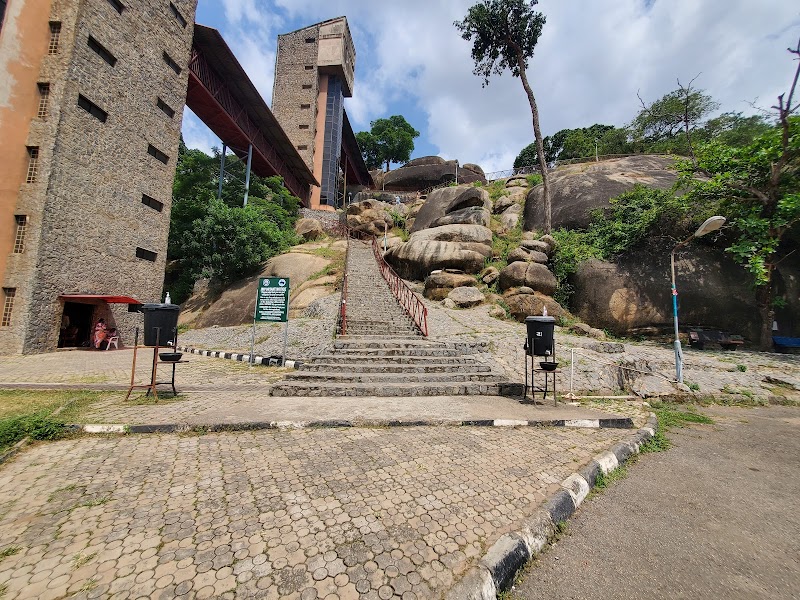
Ago-Iwoye's Annual Trading and Cultural Fairs offer an immersive experience where tradition meets commerce. Visitors navigate lively markets and cultural displays in an engaging outdoor setting that balances vibrancy with practical adventure.
Wear Comfortable Sturdy Footwear
The fairgrounds spread over uneven, sometimes dusty terrain that demands supportive shoes to handle rough paths and long hours.
Stay Hydrated
Bring enough water to last several hours; outdoor stalls exist, but having your own supply avoids unnecessary detours or dehydration.
Arrive Early
Beat the midday heat and crowds by starting your day early, when the atmosphere is fresh and vendors are setting up.
Respect Cultural Protocols
Ask permission before photographing performances or traditional ceremonies to honor local customs and ensure positive interactions.
Exploring Ago-Iwoye’s Annual Trading and Cultural Fairs: A Vibrant Fusion of Tradition and Commerce
Every year, the town of Ago-Iwoye in Ogun State bursts into life with its Annual Trading and Cultural Fairs—a dynamic event that bridges history and modern enterprise. These fairs are more than commercial exchanges; they are gatherings where tradition pulses through streets lined with colorful stalls, local artisans, and traders from across the region. The atmosphere is charged, a living marketplace where you can engage directly with vibrant Yoruba culture.
The fairgrounds spread across natural undulations that challenge visitors on foot, a practical reminder that this adventure demands comfortable footwear and stamina. Expect to navigate roughly two to three kilometers of bustling, often unpaved paths under the shade of tall iroko and mahogany trees, whose branches sway with purpose, almost as if inviting everyone to participate.
Trading here is fierce but respectful, the pulse of barter matching the rhythms of drummers and dancers performing at designated cultural arenas. You’ll witness cloth weavers demonstrating their craft, spice merchants offering fragrant samples, and food stalls tempting you with local delicacies such as amala and ewedu soups. The hum of negotiation is constant—both a commercial dance and a cultural exchange requiring patience and a good spirit.
Timing your visit is crucial. The fair typically coincides with the dry season peak, between November and February, when the weather sharpens the senses but demands hydration and sun protection. Carry a bottle heavy enough to keep you going for hours; vendors offer refreshments but having your supply prepares you for the unpredictable pace of exploration.
Cultural programming is not just side entertainment; it offers a focused lens on Yoruba heritage with storytelling, traditional music, and drama that expose the complex layers of local history. Respect these moments—photographing dancers or ceremonies requires tact and sometimes, prior permission.
Nearby, the town’s terrain rises gently in some quarters, offering spots to sit quietly and watch the fair pulse below—natural resting points where the energy of the day absorbs into the landscape. These are perfect for a brief reprieve or quiet reflection on the vibrant interplay of commerce and culture.
Practical advice: lightweight, breathable clothing will keep you comfortable; sturdy shoes will negotiate uneven surfaces. Plan to spend an entire day soaking in trades, tastes, and traditions. Arriving early helps avoid crowds and provides a cooler window to explore before the sun climbs relentlessly overhead.
The Annual Trading and Cultural Fairs in Ago-Iwoye aren’t just market days. They are immersive encounters with a fiercely alive community that honors its roots while embracing the future. Whether you come for the adventure of discovery, the richness of cultural exchange, or the thrill of negotiation, you’ll leave with more than souvenirs—you will carry an experience that lingers long after the stalls close.
Nearby Trips
All Adventures
Boat Charters
Water Activities
Adventures near Ago-Iwoye, Ogun State
Discover the unique and memorable adventures that make Ago-Iwoye, Ogun State special.
Frequently Asked Questions
When exactly does the Annual Trading and Cultural Fair in Ago-Iwoye take place?
The fair usually runs annually between late November and early February, coinciding with the dry season to optimize both trading conditions and cultural events.
Are there any footwear recommendations for attending the fair?
Yes, sturdy shoes or comfortable walking sandals with good grip are recommended due to the fair's location over slightly rugged and sometimes dusty terrain.
What unique cultural elements can visitors expect at the fair?
Visitors will encounter traditional cloth weaving, Yoruba drumming and dance performances, storytelling sessions, and a variety of regional food stalls, all offering windows into Yoruba heritage.
Are photography and videography allowed during the events?
Photography is encouraged but should be done respectfully. For cultural performances or ceremonies, seek permission first to respect local customs.
What wildlife might visitors observe around the fairgrounds?
While primarily urban, the surrounding trees and small forested patches occasionally host colorful bird species such as weaver birds, hornbills, and occasional monkey sightings in the outskirts.
Is the fair suitable for families with children?
Yes, the fair offers family-friendly attractions with food stalls and cultural performances, but parents should supervise children closely because of the crowds and uneven ground.
Recommended Gear
Sturdy Walking Shoes
Supportive footwear navigates uneven, occasionally dusty or slippery paths safely throughout all seasons.
Reusable Water Bottle
Keeps hydration levels steady amid dry, warm conditions during peak fair days.
Lightweight Sun Hat
Protects your head and face during long exposure in the sun-heavy midday hours.
Portable Power Bank
Ensures your phone stays charged for navigation, photography, and emergency contact.
Local Insights
Hidden Gems
- "A small hill overlooking the fairgrounds offers a quiet spot to watch the hustle below from a natural vantage point."
- "A nearby palm wine vendor operates just down a side path, providing a local refreshment rarely mentioned in official guides."
Wildlife
- "Occasional playful monkeys in shaded tree clusters on the fair's perimeter"
- "Varied birdlife including native species such as the Dideric cuckoo and African grey hornbill"
History
"Ago-Iwoye's fairs trace back to pre-colonial times when the town served as a key trading node between coastal and inland Yoruba communities, blending commerce and cultural exchange that remain central today."
